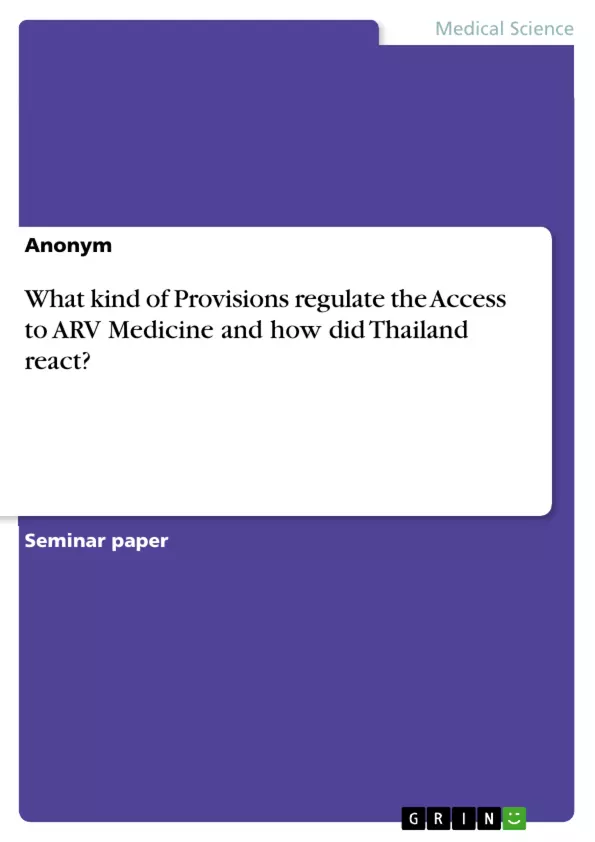The Human Immunodeficiency Virus, short called HIV, targets the human immune system and weakens the surveillance and defense system against infections. Infected people become gradually immunodeficient, while the virus destroys and impairs the function of immune cells. The Immune function is typically measured by the CD4 cell count. The most advanced stage of HIV is the Acquired Immunodeficiency Syndrome (AIDS).
HIV is a major public health issue, since it is the “world’s most leading infectious killer“ (WHO, 2014). Until today, no cure for HIV was found, but treatment with antiretroviral (ARV) drugs can help to control the virus. In a standard antiretroviral therapy (ART) are at least three antiretroviral drugs combatant to suppress the HIV virus and stop the progression of the disease. In 2013 around 12.9 million people are receiving ART globally, of which 11.7 million were in low- and middle-income countries.
Inhaltsverzeichnis (Table of Contents)
- I. Introduction
- II. Provisions that regulate the Access to ARVs
- The TRIPS Agreement
- Compulsory licensing
- Voluntary licensing
- Parallel importing
- TRIPS Plus “TRIPS Plus is going even further than TRIPS” (MSF, 2011)
- III. Which provision has been applied? Case study Thailand - granting a compulsory license
- IV. Conclusion
Zielsetzung und Themenschwerpunkte (Objectives and Key Themes)
This work aims to examine the provisions within the TRIPS Agreement that regulate access to antiretroviral (ARV) drugs, focusing on the impact of intellectual property rights on the availability of HIV medication worldwide. The work investigates the role of generic drugs and analyzes the case of Thailand's reaction to TRIPS, particularly their use of flexibilities within the agreement.
- The impact of the TRIPS Agreement on access to ARV drugs
- The role of intellectual property rights in drug pricing and availability
- The significance of generic drugs in expanding access to medication
- The flexibilities within the TRIPS Agreement for countries to address public health concerns
- The case study of Thailand's implementation of a compulsory license for ARV drugs
Zusammenfassung der Kapitel (Chapter Summaries)
- I. Introduction: This chapter provides a brief overview of HIV/AIDS as a global public health issue, highlighting the importance of ARV drugs in controlling the virus and the challenges of achieving universal access to treatment. It introduces the TRIPS Agreement and its impact on generic drug production and drug prices.
- II. Provisions that regulate the Access to ARVs: This chapter delves into the specifics of the TRIPS Agreement, examining its provisions for intellectual property rights protection, including patents, copyrights, trademarks, and industrial designs. It explores the concept of "Bolar exemption" and its implications for generic drug manufacturers. The chapter also discusses the Doha Declaration and its emphasis on public health concerns, particularly in developing countries.
- III. Which provision has been applied? Case study Thailand - granting a compulsory license: This chapter focuses on the case of Thailand, examining their use of a compulsory license to access affordable ARV drugs. It analyzes the legal and ethical considerations involved in granting a compulsory license and its implications for both patent holders and public health.
Schlüsselwörter (Keywords)
This work explores the key concepts of intellectual property rights, TRIPS Agreement, access to medication, generic drugs, compulsory licensing, public health, HIV/AIDS, and the case of Thailand. It examines the impact of these factors on the availability and affordability of antiretroviral drugs worldwide.
Frequently Asked Questions
How does the TRIPS Agreement affect access to HIV medicine?
The TRIPS Agreement sets international standards for intellectual property rights, which can lead to high prices for patented ARV drugs, making them less accessible in developing countries.
What is a compulsory license in the context of ARVs?
A compulsory license allows a government to permit someone else to produce a patented product or process without the consent of the patent owner, often used to ensure access to affordable medicines during public health crises.
Why did Thailand grant a compulsory license for ARV drugs?
Thailand used this flexibility within TRIPS to lower the costs of life-saving HIV treatment, allowing the production or import of cheaper generic versions of ARV drugs.
What is the difference between voluntary and compulsory licensing?
Voluntary licensing happens when the patent holder agrees to let others produce the drug, usually for a fee. Compulsory licensing is mandated by the government without the patent holder's prior consent for public interest reasons.
What are "TRIPS Plus" provisions?
TRIPS Plus refers to even stricter intellectual property rules than those required by the original TRIPS Agreement, often included in bilateral trade deals, which can further restrict access to generic medicines.
- Quote paper
- Anonym (Author), 2015, What kind of Provisions regulate the Access to ARV Medicine and how did Thailand react?, Munich, GRIN Verlag, https://www.grin.com/document/303796



